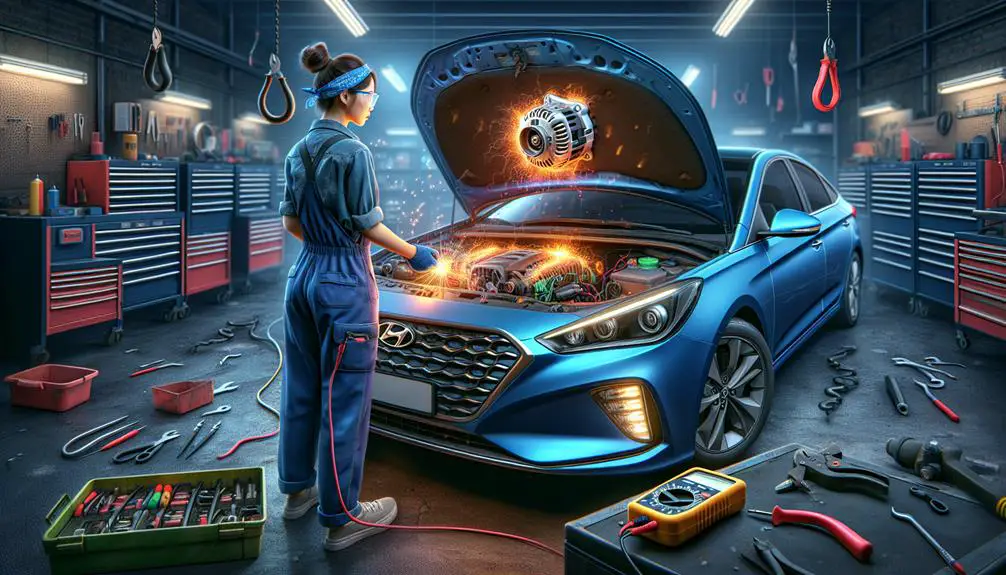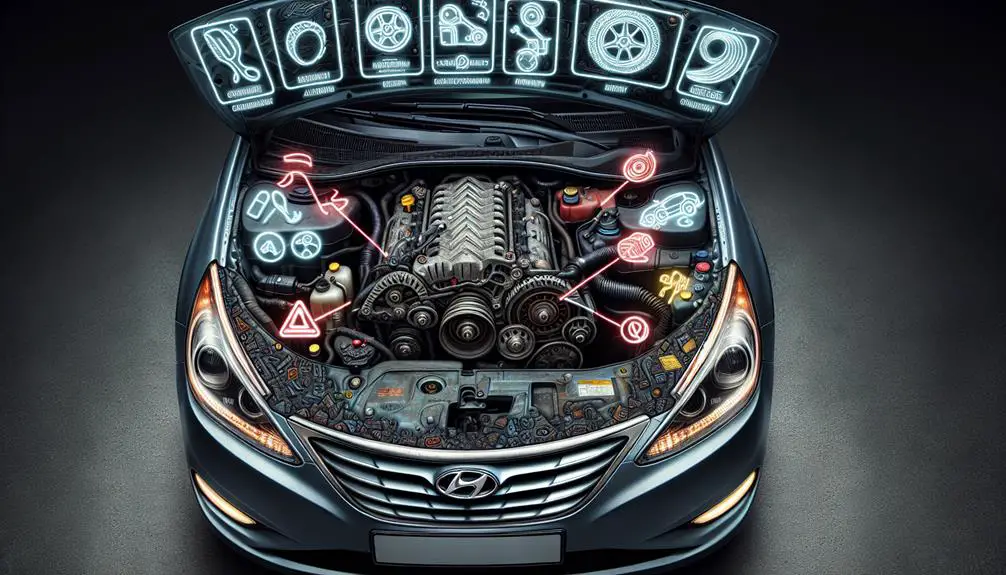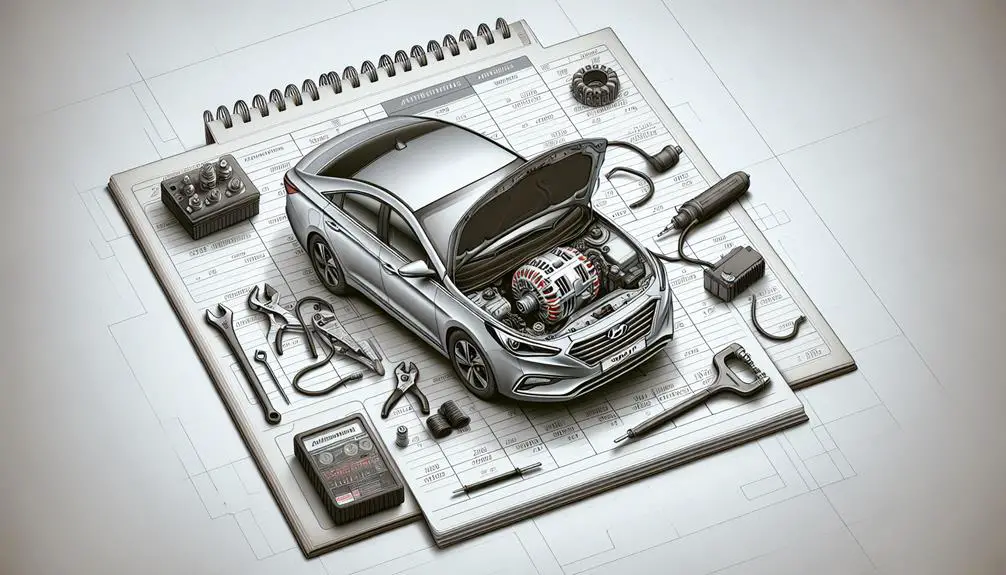Hyundai Sonata alternator issues manifest as dimming headlights and starting difficulties, indicating electrical problems.
Recognizing early signs and understanding root causes are crucial.
Tackling and preventing further vehicle malfunctions ensures reliability on the road.
Identifying Alternator Issues

Several signs indicate a potential alternator issue in your Hyundai Sonata, such as dim headlights and a dashboard battery warning light. Other signs include trouble starting the car, which suggests the alternator may not be charging the battery properly.
Electrical components like the radio, power windows, or air conditioning mightn't work well, indicating the alternator isn't providing enough power. A whining or grinding noise from the engine suggests the alternator bearings might be failing.
If you notice any of these signs, it's important to have your Sonata checked to prevent a dead battery or further electrical system damage. The alternator is crucial for charging the car's battery and powering electrical components.
Common Symptoms
If your Hyundai Sonata has alternator problems, you may notice dim headlights or a battery warning on your dashboard. The alternator is important for powering the car's electrical systems and charging the battery. Issues can cause other problems.
Your car's electrical features mightn't work properly, such as the radio cutting out or power windows moving slowly. The car may also struggle to start. A strange noise from the engine could mean the alternator bearings are failing. If your car's battery often dies, it suggests the alternator isn't charging it correctly. If you smell burning rubber or hot wires, the alternator may be overheating.
These signs show your car needs attention. Recognizing them early can prevent bigger problems.
Possible Causes

To fix your Hyundai Sonata's alternator, first find out why it's failing. Here are the reasons:
- The alternator belt might be worn or loose. If it's not tight, the alternator can't charge the battery well. You may hear a slipping or squealing noise.
- The alternator bearings could be old or broken. These help the alternator spin smoothly. If they're damaged, the alternator can't spin fast enough, causing poor charging.
- Corrosion can harm the alternator's performance. Over time, the connections to the alternator can get corroded, which reduces electricity flow and lessens charging ability.
- The alternator might simply be old and not working as well. Alternators wear out over time and eventually can't charge the battery.
- A faulty electrical component using too much power can make the alternator work too hard. This isn't the alternator's fault but can still cause it to fail early.
To fix your car's electrical system, figure out which of these issues is happening. Don't assume; check each possibility carefully.
Step-by-Step Solutions
To fix your Hyundai Sonata's alternator issues, follow these simple steps. Make sure to correctly diagnose the problem first. If unsure, ask a professional. Otherwise, use a multimeter to check if the alternator gives out 13.5 to 14.5 volts when the engine runs.
Follow these steps:
- Check the Alternator Belt: Look for any wear or damage on the belt. If it's loose or damaged, it mightn't turn well, causing failure. Tighten or replace the belt if needed.
- Inspect the Battery: Ensure the battery connections are clean, tight, and free from corrosion. A faulty battery can overload the alternator.
- Test the Alternator: With your multimeter, measure the alternator's output. If it's lower than 13.5 volts, consider replacing the alternator.
- Look for Wiring Issues: Check the alternator's electrical connections for looseness or corrosion. Bad wiring can stop the alternator from charging properly.
If these steps don't fix the issue, you may need a new alternator. If you're comfortable, you can replace it yourself, or you can get professional help to ensure it's done right.
Preventive Measures

To avoid issues with your Hyundai Sonata alternator, regularly check your vehicle's electrical system. Doing this helps your alternator work well and prevents breakdowns and expensive repairs. Here's how to keep your alternator in good shape:
First, monitor your battery's condition. A bad battery can overload the alternator, causing it to fail early. Make sure the battery connections are clean, tight, and free of corrosion. If you're unsure about your battery's condition, get it tested during your usual oil change or service appointment.
Next, pay attention to any strange noises. A failing alternator may produce a whining or grinding sound due to bearing failure. If you notice odd sounds, have your alternator inspected.
Also, watch how many power-hungry accessories you use at once. Using too many can strain the alternator. Try to limit the use of high-energy devices, especially when the engine is idling or running slowly.
Here's a simple table summarizing the maintenance tips and their benefits:
- Regular battery checks: Helps avoid too much load on the alternator.
- Listen for unusual noises: Allows for early problem detection.
- Manage electrical load: Helps the alternator last longer.
Conclusion
To finish up, this guide showed you how to find issues with your Hyundai Sonata's alternator.
You learned how to spot problems, understand why they happen, and how to fix them.
Remember, it's important to check your car regularly and fix things early. This can prevent bigger problems later.
Keep an eye on your car, and your Sonata's alternator will work well for a long time.